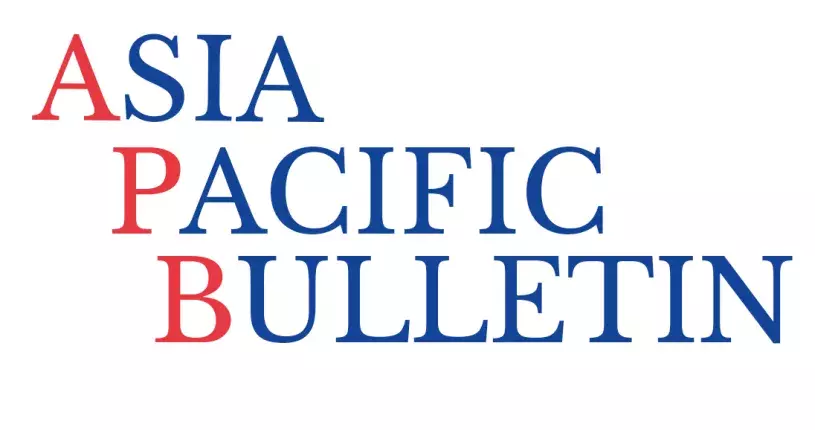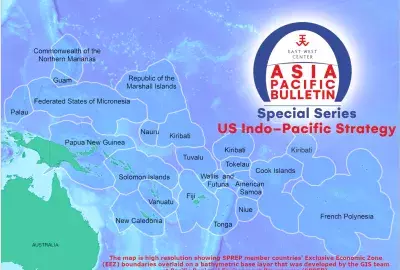Error message


| Hideshi Futori, Member of the Japanese House of Representatives, explains the need for "a framework for cooperation to solve issues involving both Japan and South Korea as the turbulent international environment in East Asia continues," which includes "common military threats from China, North Korea, and Russia." |
| for additional titles in the Asia Pacific Bulletin |
South Korean President Yoon Seok-yeol began his remarkable administration by emphasizing the values of freedom and democracy, and the triangular Japan-U.S.-ROK relationship. Contrasting the previous administration, which prioritized reconciliation with North Korea, President Yoon embraced positive messages on restoring Japan-ROK relations even before taking office. On August 15, the National Liberation Day of Korea, President Yoon described Japan as a “neighbor that joins forces against the challenges that threaten freedom.” Such a posture clearly distinguishes President Yoon’s approach from that of previous South Korean administrations. Truly, even after the Yoon Administration’s approval rating began declining, Japan-ROK relations were not used politically to alleviate the pressure. One of the best takeaways from my recent visit to South Korea was Foreign Minister Park Chun’s assurance to “persistently work from a strategic perspective to improve relations with Japan, a partner that shares the universal values of freedom, human rights, and the rule of law.”
Heretofore, Japan has not been able to capitalize on the precious opportunities it has been afforded to mend ties with Korea. Instead, Japan continues to take a hardline approach toward South Korea and is unable to flexibly respond, instead prioritizing Japan’s self-image, as suggested by the export control regulations toward South Korea. Since 2019, the Japanese government has tightened control regulations on exports of semiconductor materials to South Korea in response to potential seizures of Japanese assets as reparations for forced labor claims related to Japan’s 1910-1945 colonial rule of the Korean Peninsula. I believe Japan should consider changing its policies toward South Korea as South Korea has proactively improved its policies in response to Japan’s request, nonetheless, the effects have faded. From the perspective of economic security, it is also necessary to diversify Japan’s supply chain and strengthen trilateral cooperation between Japan, the United States, and South Korea. Similar voices have been raised not only from South Korea but also by Japanese experts.
Compared to the more incidental rows with Korea, historical and territorial issues directly linked to Japan’s sovereignty will be far more difficult to settle as there is little room for compromise. That said, Japan should clarify its priorities and create a framework for cooperation to solve issues involving both Japan and South Korea as the turbulent international environment in East Asia continues. In particular, Japan and South Korea are exposed to common military threats from China, North Korea, and Russia. Thus, strengthening diplomatic ties and security cooperation between Japan and South Korea should be prioritized as soon as possible. To this end, the two nations should pursue the following steps:
- enact Japan-South Korea (2+2) Foreign and Defense Ministerial Meetings or the Quadrilateral Security Dialogue (QSD),
- regularize Japan-ROK-US Joint military drills,
- normalize the Japan-South Korea General Security of Military Information Agreement, and
- establish a joint response system in the event of an emergency in Taiwan or the Korean Peninsula.
With the North Korean abduction issue, Japan, South Korea, and the United States should cooperate and make every effort to rescue the victims. I have been paying close attention to the abduction issue, as I repeatedly called for cooperation during my visit to Korea. Recently, I attended an international conference in Washington, DC, on the abduction issue. In addition to working closely with South Korea, which also has more than 500 abductees, to share information, Japan should step up its advocacy with other partners. Thus, in the name of protecting democracy, freedom, and humanitarianism, Japan should call upon the United States and international organizations to accelerate efforts to find a breakthrough in rescuing these victims.
In late August, I visited South Korea with eight young members of the Diet. The timing of the visit was challenging as a claim against a Japanese company for wartime labor compensation was working its way through the Korean legal system. Moreover, COVID-19 overseas travel restrictions and other similar issues continued to put pressure on bilateral relations. Nonetheless, we had to overcome these difficulties and conduct meetings with the Minister of Foreign Affairs of the Republic of Korea (ROK), members of the National Assembly of both parties, the Korean ambassador to Japan, university professors, and think-tank researchers.
The purpose of this visit to South Korea was to explore the possibility of improving Japan-ROK relations, which are said to be the worst since the normalization of diplomatic relations. Bilateral relations have reached a stalemate due to numerous diplomatic hurdles. Recent examples include the dissolution of previous agreements covering Korean claims of forced wartime labor and the Korean comfort women issue , a dispute over a ROK naval vessel acquiring a radar-lock on a Japanese Self-Defense Force aircraft , and the tightening of Japanese export control regulations on South Korea. A full-fledged summit between Japan and South Korea has not been held in more than a decade. A breakthrough in relations requires the next generation of political leaders to focus on future-oriented politics. Thus, we aim to foment improvement by actively engaging younger Korean and Japanese parliamentarians in bilateral diplomatic efforts. The complex relations between Japan and South Korea have overcome numerous crises through people-to-people connections between politicians.
I had many positive exchanges with young members of the Korean National Assembly on common issues such as security, climate change, renewable energy, over-centralization, and measures to address low fertility. Specifically, during this visit to South Korea, I realized the younger generation in Korea and Japan have the potential and the inclination to rebuild bilateral relations. As South Korea began to import Japanese pop culture in the late 1990s, those who reached adulthood after 1998 can often sympathize with popular topics such as dramas and animations from both countries. Thus, we, the next generation of legislators, are the key to guiding Japan-ROK relations into a better trajectory. We will continue to develop parliamentary diplomacy from a strategic perspective and make every effort to improve Japan-ROK relations for the peace and prosperity of Asia.

| Hideshi Futori, Member of the Japanese House of Representatives, explains the need for "a framework for cooperation to solve issues involving both Japan and South Korea as the turbulent international environment in East Asia continues," which includes "common military threats from China, North Korea, and Russia." |
| for additional titles in the Asia Pacific Bulletin |
South Korean President Yoon Seok-yeol began his remarkable administration by emphasizing the values of freedom and democracy, and the triangular Japan-U.S.-ROK relationship. Contrasting the previous administration, which prioritized reconciliation with North Korea, President Yoon embraced positive messages on restoring Japan-ROK relations even before taking office. On August 15, the National Liberation Day of Korea, President Yoon described Japan as a “neighbor that joins forces against the challenges that threaten freedom.” Such a posture clearly distinguishes President Yoon’s approach from that of previous South Korean administrations. Truly, even after the Yoon Administration’s approval rating began declining, Japan-ROK relations were not used politically to alleviate the pressure. One of the best takeaways from my recent visit to South Korea was Foreign Minister Park Chun’s assurance to “persistently work from a strategic perspective to improve relations with Japan, a partner that shares the universal values of freedom, human rights, and the rule of law.”
Heretofore, Japan has not been able to capitalize on the precious opportunities it has been afforded to mend ties with Korea. Instead, Japan continues to take a hardline approach toward South Korea and is unable to flexibly respond, instead prioritizing Japan’s self-image, as suggested by the export control regulations toward South Korea. Since 2019, the Japanese government has tightened control regulations on exports of semiconductor materials to South Korea in response to potential seizures of Japanese assets as reparations for forced labor claims related to Japan’s 1910-1945 colonial rule of the Korean Peninsula. I believe Japan should consider changing its policies toward South Korea as South Korea has proactively improved its policies in response to Japan’s request, nonetheless, the effects have faded. From the perspective of economic security, it is also necessary to diversify Japan’s supply chain and strengthen trilateral cooperation between Japan, the United States, and South Korea. Similar voices have been raised not only from South Korea but also by Japanese experts.
Compared to the more incidental rows with Korea, historical and territorial issues directly linked to Japan’s sovereignty will be far more difficult to settle as there is little room for compromise. That said, Japan should clarify its priorities and create a framework for cooperation to solve issues involving both Japan and South Korea as the turbulent international environment in East Asia continues. In particular, Japan and South Korea are exposed to common military threats from China, North Korea, and Russia. Thus, strengthening diplomatic ties and security cooperation between Japan and South Korea should be prioritized as soon as possible. To this end, the two nations should pursue the following steps:
- enact Japan-South Korea (2+2) Foreign and Defense Ministerial Meetings or the Quadrilateral Security Dialogue (QSD),
- regularize Japan-ROK-US Joint military drills,
- normalize the Japan-South Korea General Security of Military Information Agreement, and
- establish a joint response system in the event of an emergency in Taiwan or the Korean Peninsula.
With the North Korean abduction issue, Japan, South Korea, and the United States should cooperate and make every effort to rescue the victims. I have been paying close attention to the abduction issue, as I repeatedly called for cooperation during my visit to Korea. Recently, I attended an international conference in Washington, DC, on the abduction issue. In addition to working closely with South Korea, which also has more than 500 abductees, to share information, Japan should step up its advocacy with other partners. Thus, in the name of protecting democracy, freedom, and humanitarianism, Japan should call upon the United States and international organizations to accelerate efforts to find a breakthrough in rescuing these victims.
In late August, I visited South Korea with eight young members of the Diet. The timing of the visit was challenging as a claim against a Japanese company for wartime labor compensation was working its way through the Korean legal system. Moreover, COVID-19 overseas travel restrictions and other similar issues continued to put pressure on bilateral relations. Nonetheless, we had to overcome these difficulties and conduct meetings with the Minister of Foreign Affairs of the Republic of Korea (ROK), members of the National Assembly of both parties, the Korean ambassador to Japan, university professors, and think-tank researchers.
The purpose of this visit to South Korea was to explore the possibility of improving Japan-ROK relations, which are said to be the worst since the normalization of diplomatic relations. Bilateral relations have reached a stalemate due to numerous diplomatic hurdles. Recent examples include the dissolution of previous agreements covering Korean claims of forced wartime labor and the Korean comfort women issue , a dispute over a ROK naval vessel acquiring a radar-lock on a Japanese Self-Defense Force aircraft , and the tightening of Japanese export control regulations on South Korea. A full-fledged summit between Japan and South Korea has not been held in more than a decade. A breakthrough in relations requires the next generation of political leaders to focus on future-oriented politics. Thus, we aim to foment improvement by actively engaging younger Korean and Japanese parliamentarians in bilateral diplomatic efforts. The complex relations between Japan and South Korea have overcome numerous crises through people-to-people connections between politicians.
I had many positive exchanges with young members of the Korean National Assembly on common issues such as security, climate change, renewable energy, over-centralization, and measures to address low fertility. Specifically, during this visit to South Korea, I realized the younger generation in Korea and Japan have the potential and the inclination to rebuild bilateral relations. As South Korea began to import Japanese pop culture in the late 1990s, those who reached adulthood after 1998 can often sympathize with popular topics such as dramas and animations from both countries. Thus, we, the next generation of legislators, are the key to guiding Japan-ROK relations into a better trajectory. We will continue to develop parliamentary diplomacy from a strategic perspective and make every effort to improve Japan-ROK relations for the peace and prosperity of Asia.







